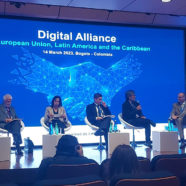
Prof. Enrique Aliste, Vice Rector for Research and Development of the University of Chile, and Prof. Jaime Ortega, Principal Investigator of the Center for Mathematical Modeling (CMM) and coordinator of the applied research line in Digital Mining of the same center, participated in the event, which took place last March in Bogota for the launching of this initiative.
On March 14, the European Union-Latin America and the Caribbean Digital Alliance was launched in Bogota, Colombia, with an initial contribution of 145 million euros from Team Europe, of which 50 million euros come from the EU budget to boost digital cooperation between the two regions. This initiative aims to promote the development of secure, resilient and human-centered digital infrastructures, ensuring a democratic and transparent environment, and focusing on privacy and digital rights.
It is the first intercontinental digital partnership agreed between the two regions under the investment strategy, the EU’s bid for reliable and sustainable connections with partner countries. The Alliance will provide a forum for regular high-level dialogue and cooperation in crucial digital areas such as infrastructure, regulatory framework, capacity building, technology, entrepreneurship, innovation and digitization of public services, as well as Earth observation and satellite navigation applications and services.
The initiative was organized by the Colombian presidency within the framework of CELAC and was launched at a high-level event by European Commission Executive Vice-President Margrethe Vestager, the Swedish Presidency of the Council of the EU and representatives of Latin America and the Caribbean and EU Member States.
Two coordination platforms, the D4D Center for Team Europe partners and ECLAC (United Nations Economic Commission for Latin America and the Caribbean) for Latin American and Caribbean partners, will generate synergies between the two regions. Participants will include governments, the private sector, international financial institutions, intergovernmental and non-governmental organizations, as well as civil society and academia.
Background
During the EU-CELAC ministerial meeting in October 2022, the creation of this alliance was proposed, highlighting its advantages for both regions. The EU-LAC Digital Alliance will drive digital projects in the EU-LAC investment program, including Global Gateway initiatives. Notable examples include the extension of the BELLA fiber optic cable to create secure digital backbone connectivity, the implementation of a regional Copernicus strategy with two regional data centers in Panama and Chile, and the creation of an EU-LAC Digital Accelerator to foster digital collaboration and innovation. The Copernicus Regional Center Chile was launched at an event held on March 11 at the University of Chile, led by Executive Vice President Vestager.
Margrethe Vestager, executive vice-president responsible for A Europe Fit for the Digital Age, stressed that the Alliance seeks to promote an inclusive and sustainable digital transformation based on the EU’s digital rights and principles and the eLAC 2024 Digital Agenda. For his part, High Representative and Vice President Josep Borrell emphasized that the alliance is based on common democratic and social values, protecting citizens’ rights both online and offline.
The Commissioner responsible for International Partnerships, Jutta Urpilainen, highlighted that the EU-LAC Digital Alliance is part of the EU’s Global Gateway strategy to accelerate the double transition and connect people in both regions through reliable infrastructures and a democratic environment that closes inequalities and provides opportunities for citizens and businesses.
This partnership represents an important step to promote digital collaboration between the European Union and Latin America and the Caribbean, fostering innovation and sustainable development in both regions.
Roundtables
After the opening session, the long workday was followed by a series of round tables, with topics such as inclusive digitalization, private sector involvement, 5G and meaningful connectivity.
The Vice Rector for Research and Development, University of Chile, Prof. Enrique Aliste, led the presentations during the third session. The round table, entitled The importance of Earth Observation for a just transition, aimed to explain Earth Observation services and their potential use for the environment, industry, mining and risk and disaster reduction; to present the Copernicus Regional Centers in Panama and Chile commenting on their differences and complementarities; to establish links with the BELLA network; and, finally, to launch the business incubation center in connection with the Digital Accelerator.

Prof. Jaime Ortega, researcher at the Center for Mathematical Modeling (CMM) and professor at the Department of Mathematical Engineering (DIM) of the U. de Chile, participated with Vice Rector Aliste in this important event as Scientific Director of the Copernicus Regional Center Chile.

Further information at European Comission
Posted on Jul 20, 2023 in News




 Noticias en español
Noticias en español
